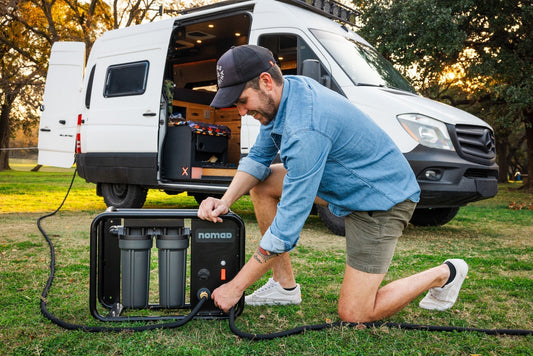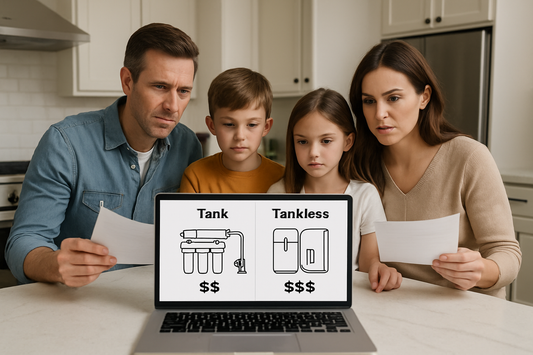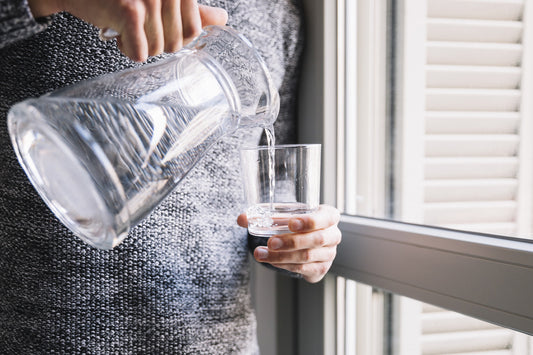It's 2 PM on a Tuesday, and Sarah from accounting is struggling to focus on her quarterly report. Her head feels foggy, she's irritable, and productivity has hit a wall. The culprit? She's been drinking questionable tap water all day, and her body is silently rebelling.
This scenario plays out in offices across America every single day. While most business owners obsess over the latest productivity apps and ergonomic furniture, they're missing a fundamental factor that directly impacts their bottom line: clean, filtered water.
The truth is, office water filtration systems aren't just a nice-to-have amenity—they're a strategic business investment that can transform your workplace performance from the inside out.
Why Your Office Water Quality Is Sabotaging Success
Before diving into solutions, let's talk about what's actually flowing from your office taps. Municipal water systems, while regulated, often contain chlorine, heavy metals, and trace pharmaceuticals that can affect taste, smell, and yes—your team's cognitive function.
Research shows that even mild dehydration (as little as 2% fluid loss) can reduce concentration by up to 23%. But here's the kicker: when water tastes or smells off, employees naturally drink less of it. It's a vicious cycle that's costing your business more than you realize.

Image by pixel-shot.com
The Real Cost of Poor Office Water
Let's crunch some numbers that'll make your CFO take notice:
- Sick days: Employees with access to clean water report 15% fewer sick days annually
- Productivity losses: Dehydrated workers show decreased cognitive performance equivalent to being mildly intoxicated
- Turnover costs: Companies prioritizing employee wellness (including quality water) see 40% lower turnover rates
When you frame it this way, water filtration systems for office environments aren't an expense—they're an investment in human capital.
The Science Behind Clean Water and Peak Performance
Your brain is 75% water, and it's the first organ to suffer when hydration dips. Clean, filtered water doesn't just quench thirst—it optimizes the biological processes that drive workplace excellence.
Premium filtration removes chlorine (which can cause headaches), heavy metals (linked to brain fog), and other contaminants that subtly drain energy levels throughout the day. The result? Employees who feel sharper, stay focused longer, and actually enjoy drinking water.
Water filter benefits extend beyond individual performance to create a ripple effect throughout your organization:
- Enhanced decision-making capabilities
- Improved mood and reduced workplace stress
- Better immune function (fewer sick days)
- Increased overall job satisfaction
Choosing the Right Water Filter for Office Success
Not all filtration systems are created equal, especially in commercial settings. Here's what smart business owners are installing to maximize their investment:
Reverse Osmosis: The Performance Powerhouse
RO systems are the gold standard for offices serious about water quality. They remove 99% of contaminants, including dissolved solids, bacteria, and chemical pollutants. While the initial investment is higher, the long-term water filter benefits include:
- Consistently pure, great-tasting water
- Reduced maintenance compared to other systems
- Professional-grade filtration that impresses clients
- Scalability for growing teams
Carbon Filtration: The Smart Middle Ground
For offices wanting immediate improvement without breaking the budget, activated carbon filters offer excellent value. They excel at removing chlorine, improving taste, and eliminating odors—the most common complaints about office tap water.
These systems integrate seamlessly with existing plumbing and provide instant results that employees notice immediately.
UV Sterilization: The Health Guardian
UV filters add an extra layer of protection by neutralizing bacteria and viruses without chemicals. They're particularly valuable in older buildings where plumbing might harbor microorganisms.

Image by freepik
Implementation Strategy: Making the Switch Seamless
Rolling out a new water filter for office use doesn't have to disrupt operations. Here's how forward-thinking companies are making the transition:
Week 1: Assessment and Planning
- Test current water quality
- Survey employee preferences
- Calculate potential ROI based on team size
Week 2: Installation and Setup
- Professional installation during off-hours
- System testing and calibration
- Employee orientation and education
Week 3: Monitoring and Optimization
- Track usage patterns
- Gather employee feedback
- Fine-tune system performance
The key is treating this as a wellness initiative, not just a facilities upgrade. When employees understand the health and performance benefits, adoption rates skyrocket.
Real-World Results: Companies That Made the Switch
TechStart Solutions, a 50-person marketing agency in Austin, installed comprehensive office water filtration systems last year. The results speak for themselves:
- 28% reduction in sick days
- 15% increase in afternoon productivity scores
- 89% employee satisfaction with the upgrade
- Full ROI achieved within 8 months
"Our team actually looks forward to their water breaks now," says Maria Rodriguez, TechStart's HR director. "It sounds simple, but the impact on morale and health has been incredible."
Beyond the Basics: Advanced Filtration Features
Modern water filtration systems for office environments offer features that go beyond basic purification:
Smart Monitoring Systems
- Real-time quality alerts
- Automated maintenance reminders
- Usage analytics and reporting
Sustainability Features
- Reduced plastic bottle waste
- Energy-efficient operation
- Recyclable filter components
Customization Options
- Temperature control settings
- Mineral enhancement capabilities
- Scalable capacity for different office sizes
The Competitive Advantage You Can't Ignore
In today's talent market, top performers have choices. They're drawn to companies that demonstrate genuine care for employee wellbeing. Premium office water filtration isn't just about health—it's about signaling that you invest in your team's success.
Consider this: the cost of replacing one skilled employee typically ranges from $15,000 to $50,000. If clean water helps retain even one valuable team member, the system pays for itself immediately.

Image by lazy_bear
Making the Investment Decision
When evaluating water filter for office options, consider these factors:
Team Size: Larger teams need higher-capacity systems with faster flow rates
Water Quality: Areas with harder water or more contaminants require more robust filtration
Budget: Balance upfront costs with long-term savings on bottled water and healthcare Growth Plans: Choose systems that can scale with your expanding workforce
Your Next Steps to Cleaner, More Productive Workplace
Transforming your office water quality isn't complicated, but it requires the right approach. Start by testing your current water to understand what you're working with. Then, match your filtration solution to your specific needs and budget.
The companies winning the talent war understand that exceptional employee experiences are built on fundamental basics—and clean, great-tasting water is one of the most impactful investments you can make.
Ready to see what peak hydration can do for your team's performance? The transformation starts with a single decision: prioritizing the health and productivity of your most valuable asset—your people.
FAQ
What type of water filter is best for offices?
Reverse osmosis systems offer the most comprehensive filtration for office environments, removing 99% of contaminants while providing consistent, great-tasting water that employees actually want to drink.
How much can office water filtration improve productivity?
Studies show that proper hydration can improve cognitive performance by up to 23%, while clean-tasting water increases consumption rates by 35-40% among office workers.
Are office water filters worth the cost?
The average ROI for office water filtration systems is 6-12 months, factoring in reduced sick days, improved productivity, and elimination of bottled water costs.
How often do office water filters need maintenance?
Most commercial-grade systems require filter replacement every 6-12 months, depending on usage and water quality, with professional servicing recommended annually.
Can water filtration systems handle high office usage?
Yes, commercial-grade systems are designed for high-volume use, with some models capable of filtering 500+ gallons per day to meet demanding office requirements.





